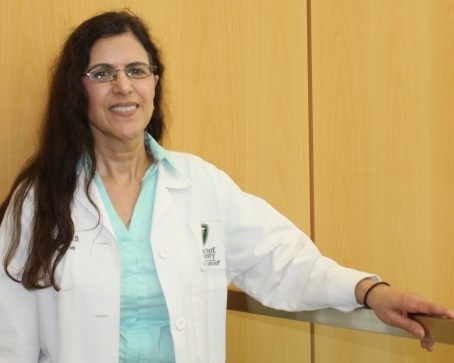Scientists at the Wayne State University School of Medicine may have found a more efficient, less-invasive and more patient-friendly method of obtaining cells from the cervix to screen for possible cancer caused by Human Papillomavirus, or HPV.
A team led by clinical Professor of Medicine and rheumatologist J. Patricia Dhar, M.D., '82, has published compelling data drawn from a completed study of self-administered cervical health monitoring in Black women with systemic lupus erythematosus, or SLE, who are patients at a Detroit health care facility.

Black women with lupus, an autoimmune disease in which the body’s immune system mistakenly attacks healthy tissue in the body, have a higher risk of cervical cancer and are more likely to die from the disease than women of other races. HPV infection is a serious health issue for women with SLE because they have a higher incidence of genital infection and cervical neoplasia, Dr. Dhar said.
The cells tested for HPV genetic information, gene activation of local inflammatory factors, or cytokines, in the vagina, and cervical cytopathology.
The researchers believe the system is a better way to test for HPV, compared to the traditional gynecologic exam and Pap smear.
The study results, “Cervical Health in Systemic Lupus Erythematosus,” were published in Women’s Health Reports.
“Awareness, education and access to testing are key to engage high-risk women to reduce their cervical cancer risk. The self-sampling brush has the potential to make cancer screening more accessible as well as allow more frequent cervical monitoring at lower cost. This also raises the question as to whether screening should be done earlier than 21 years of age for those who are sexually active and on aggressive immunosuppression,” Dr. Dhar said. “We have just touched the surface of this problem, which needs further studies to better delineate the biology of HPV infection in Black women with SLE. However, it is clear that we need to educate and empower these high-risk women to advocate for themselves and take control of their cervical health.”
Dr. Dhar was the principal investigator on the one-year study, which was funded by the Blue Cross Blue Shield Foundation Physician Investigator Research Award grant given to Dr. Dhar in 2020. She directs the Rheumatology Fellowship Program at Ascension St. John Hospital.
WSU’s C.S. Mott Center for Human Growth and Development Director Gil Mor, M.D., Ph.D.; University of Michigan’s Heather Walline, Ph.D. and Thomas Carey, Ph.D.; and Ascension St. John Hospital’s Louis Saravolatz, M.D., Lamia Fathallah, M.D., and Susanna Szpunar Ph.D., also contributed to the report.
The results showed that 70% of the 30 study participants, all Black women, showed infection with HPV, and half of those showed multiple HPV types. Subjects also had higher than expected frequency of abnormal pre-cancerous Pap smears.
“I did expect they would have higher rates of HPV infection and abnormal Paps based on my experience, but I did not expect to see multiple HPV types, including new types that are just being identified as being high risk for cancer,” Dr. Dhar said. “It verified what I was trying to demonstrate – that this is a high-risk population and needs more monitoring for cervical health.”
She encouraged individuals with similar medical histories to take care of their cervical health to prevent HPV infection by getting a Pap smear and gynecologic exam and the HPV vaccine, and by using condoms to prevent transmission from others.
“These women are ‘invisible’ and don’t have a voice. They are a marginalized, underserved population. They are sick, and often in poor social and financial circumstances, and cannot advocate for themselves – that is hard to do when you are ill and don’t have good social support,” Dr. Dhar said. “Many don’t have transportation. They are trying their best to survive but often have so many things going on that they cannot manage everything. They often don’t complain and go to different emergency departments for acute care, so it is not consistent care. They often forget appointments or feel sick and don’t want to leave the house. Providers don’t have time to spend to make sure all their needs are met. A 15-minute office visit doesn’t cut it. Lupus affects cognition and memory, so often they don’t understand the treatment regimen, but don’t speak up. They really need a good social worker who can help them manage everything: multiple appointments to specialists, medications, transportation and finding housing. They often have poor social determinants of health.”
Risk factors for acquiring HPV infection were prevalent in the study cohort, with history of sexually transmitted diseases other than HPV in 70%, not being vaccinated for HPV in 83.3%, as well as multiple lifetime sexual partners, a history of cigarette smoking, early age of first sexual intercourse, and not using condoms (73.3%). Only four participants had commercial health insurance.
Dr. Dhar’s team is now working to secure funding from the National Institutes of Health to development a cervical health monitoring program in Detroit for Black women with SLE, expand the study and look at HPV vaccination in SLE.
“This is just the start of a program that I hope to establish in Detroit for cervical health monitoring in African American women with SLE. We are very excited to move forward with this now that we have published data to support the need for a program like this,” she said.
The study received funding from the Blue Cross Blue Shield of Michigan Foundation (0030703.PIRAP), the Ascension St. John Foundation (EIN 20-2961-579), and the Ascension St. John Division of Rheumatology Research and Education Fund (34022-SJ2782).